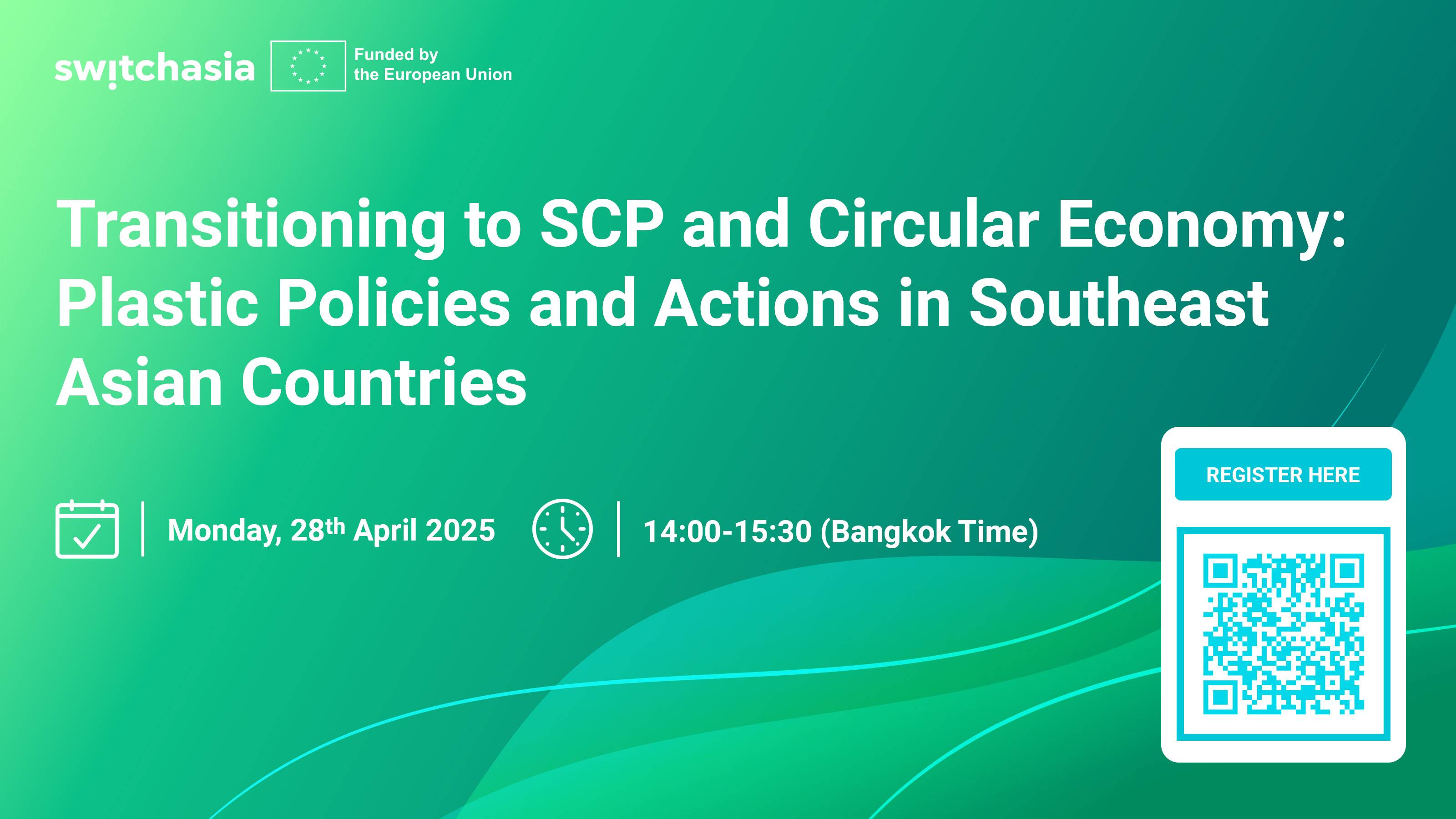
WHEN: 28 April 2025 I TIME: 14:00 - 15:30 (Bangkok Time) I Video recording HERE
Background
The Southeast Asia region is considered as one of the most important regions in the world for plastics pollution. Awareness is raising about its consequences on ecosystems and society, as shown in various legislations, policies and actions in all countries. However, dealing effectively with plastics remains a challenge for the region and countries. Bringing together national and international experts, policymakers, civil society stakeholders, and industry leaders from Southeast Asia countries, this Workshop will dive into the current system of plastics, as an entry point and driver into the transition to SCP and Circular Economy.
The Workshop will engage in knowledge-sharing while exploring pathways for a more effective implementation of policies and legislation, from a plastic system perspective, production, consumption, circularity and innovations. It will provide opportunities to exchange between the countries on respective legal and policy responses and identify ways for collective actions to confront commonly shared challenges. It will reflect on the outcomes of the recently published country profiles (see Resources here), with the aim to better understand challenges and opportunities for action, leading to takeaways that can strengthen Southeast Asia and countries’ position at the ongoing international negotiation process, and for current and future actions targeting plastics production, consumption and effective management of pollution.
Objectives:
- Foster discussions between policymakers, industry leaders, and civil society representatives from Southeast Asia on plastics policy and sustainable practices.
- Discuss the status of waste and plastics management, generally inadequate, and identify ways and needs for more efficient waste management system, processes and infrastructure.
- Discuss organisation and governance system, with respective roles of concerned stakeholders, from regional, national and city levels, together with business and households; encourage stakeholders to share information needs and explore collaborative engagement for collective actions where relevant.
- Identify pathways to improve efficiency throughout the lifecycle of plastics, production processes, use in markets and households, responsible behaviour and alternatives.
- Define transformative steps in the national and city contexts to curb plastics pollution and define actions, in particular with regards to infrastructure, technological capacity, innovation opportunities and awareness.
- Discuss what the Global Plastics Treaty’s key issues mean for Southeast Asia and national contexts. Help identify potential entry points for involvement for each actor group; delineate their roles in current/planned policies.
- Support experts and negotiators in identifying actionable insights and inform strategies to make their voices heard in the context of the negotiations.
Invitees:
Southeast Asia government and policy makers, city managers, SMEs and industry associations, civil society and NGOs, academia and research, international organizations. Representatives from these groups are expected to share their perspectives, and all participants are invited to join the discussion.
Moderator
 Dr. Arab Hoballah, Senior SCP Expert for SWITCH-Asia Policy Support Component
Dr. Arab Hoballah, Senior SCP Expert for SWITCH-Asia Policy Support Component
Speakers
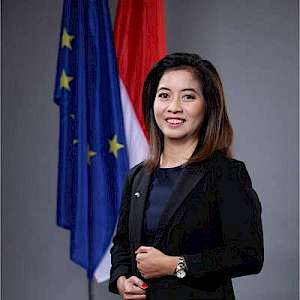 Novita Sari, Cooperation Section, Programme Manager - Environment & Climate Change, Delegation of the European Union to Indonesia and Brunei Darussalam, Delegation of the European Union to ASEAN
Novita Sari, Cooperation Section, Programme Manager - Environment & Climate Change, Delegation of the European Union to Indonesia and Brunei Darussalam, Delegation of the European Union to ASEAN
 Tobias Nielsen, EU Plastics Treaty Negotiation Team, European Environment Agency (EEA)
Tobias Nielsen, EU Plastics Treaty Negotiation Team, European Environment Agency (EEA)
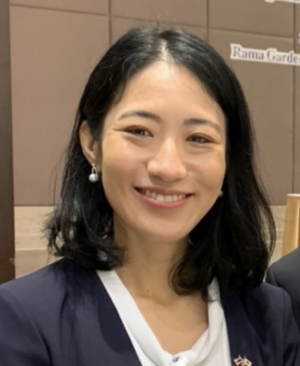 Hiroko Matsuo, Programme Management Officer, UN Environment Programme
Hiroko Matsuo, Programme Management Officer, UN Environment Programme
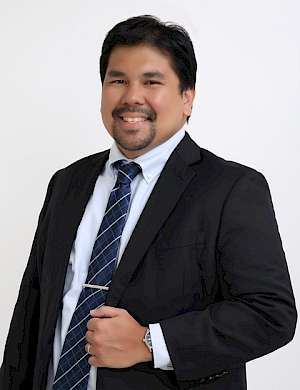 Atty. Gregorio Rafael P. Bueta, SWITCH-Asia Policy Support Component Country Expert for the Philippines; and Faculty Member, Ateneo de Manila School of Law
Atty. Gregorio Rafael P. Bueta, SWITCH-Asia Policy Support Component Country Expert for the Philippines; and Faculty Member, Ateneo de Manila School of Law
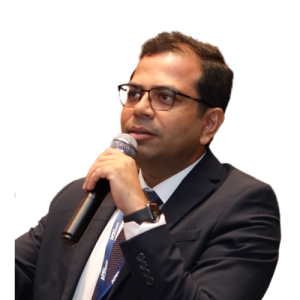
Amrendra Kumar, Founder & COO, ASM recycl
 Eknarin Ariyavongvivat, Marine Program Lead, WWF Thailand
Eknarin Ariyavongvivat, Marine Program Lead, WWF Thailand
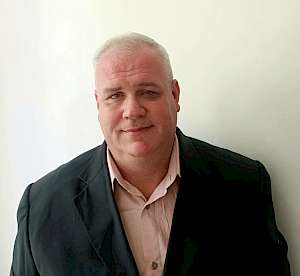 Butte Metz, Chief Innovator Precious Plastic Philippines
Butte Metz, Chief Innovator Precious Plastic Philippines
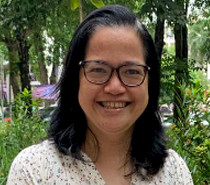 Trinh Hoa, Co-Founder, Buyoplastics, Vietnam
Trinh Hoa, Co-Founder, Buyoplastics, Vietnam
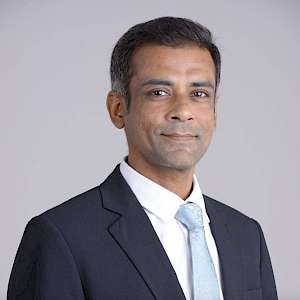 Expert, SWITCH-Asia Policy Support Component
Expert, SWITCH-Asia Policy Support Component
Agenda
|
Time |
Agenda Item |
Description |
|
|
Introduction and presentation of insights |
|||
|
15 min |
Opening |
Welcome and opening remarks Moderator: Dr. Arab Hoballah, Senior SCP Expert for SWITCH-Asia Policy Support Component
|
|
|
15 min |
Country Profiles, insights and main outcomes |
Presentation of synthesis of key findings from the Countries Profiles, common and specific challenges, way forward and relation to plastics treaty negotiations.
|
|
|
5 min |
Questions & answers |
Answering clarifying questions from the chat |
|
|
3 min |
Introduction to the discussions, organisation and guiding questions |
Overview of the session format and guiding questions. Brief introduction discussants to facilitate interactive discussions between actors. |
|
|
Sector-specific perspectives and interactive discussion |
|
||
|
20 min |
Panel 1: Policy Framework. Policies and legislation, challenges and needs for improved implementation (Moderator: Dr. Arab Hoballah) |
Panel discussion on policy frameworks, legislative challenges, and gaps in improving management of plastics from SCP and CE perspectives; identify enabling opportunities for eco-design and alternatives, green procurement, other policy instruments (EPR), and enabling capacity; identify support opportunities.
|
|
|
25 min |
Panel 2: Business, SMEs and the role of civil society for innovating responsible change (Moderator: Cosima Stahr, SWITCH-Asia Expert) |
Panel discussion focused on the role of industry/manufacturing, SMEs, and market innovations that provide innovative and alternative solutions for a more responsible plastics management, including materials use efficiency, production process, policy instruments and multiple “R”s, with emphasis on support frameworks, incentives, as well as role of civil society and support opportunities.
|
|
|
Going forward: takeaways and actions |
|
||
|
5 min |
Takeaways for improved action and support to international negotiations |
Key takeaways for pathways for more effective implementation of policy and legislation, business increased responsibility and partnerships, targeted and tailored communications for transformative actions. Takeaways in support to SEA’s countries position and inputs in international forums/negotiations. Sketch transformative steps for improved plastics management system, and for collaborative engagement across stakeholder groups.
|
|
|
5 min |
Word of thanks and conclusion |
Final remarks and conclusions, summarizing key points and outcomes of the workshop.
|
|


